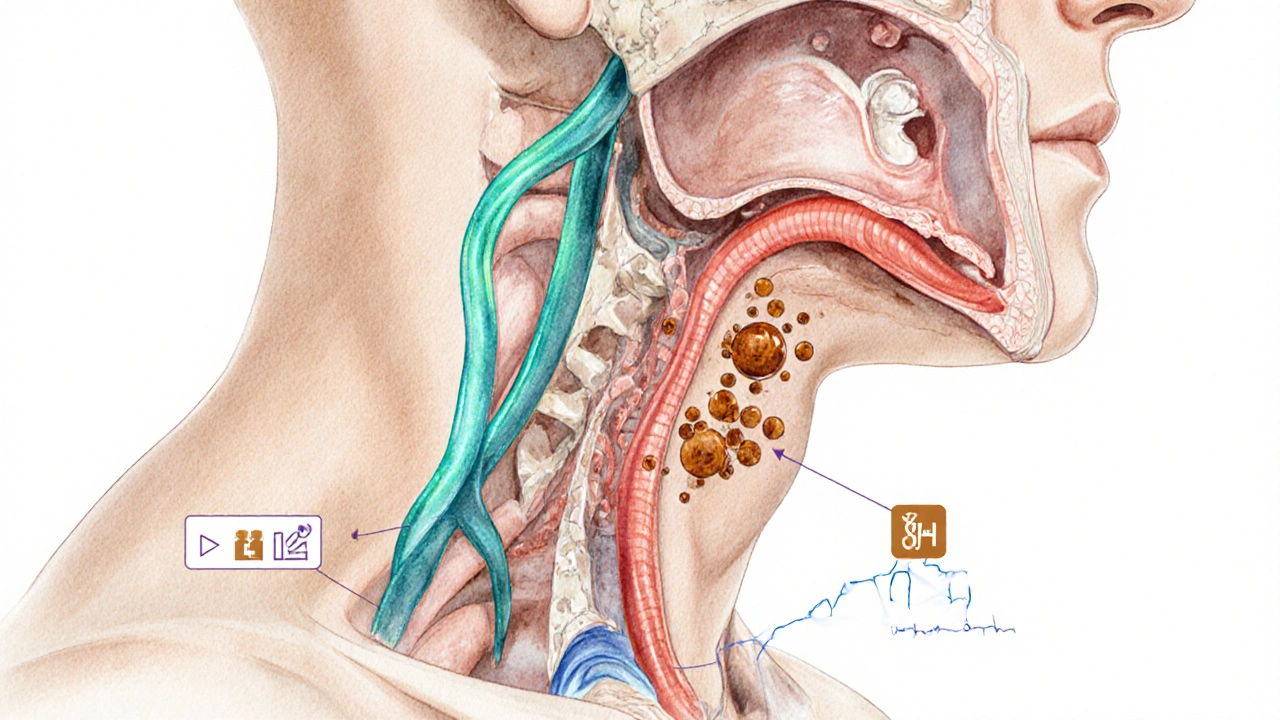Stress Cough Checker
Check if Your Cough Might Be Stress-Related
Answer the following questions to assess whether your cough could be stress-induced. This tool helps you understand potential triggers and provides guidance.
Your Results
Possible Triggers:
Ever notice a tickle in your throat when you’re nervous, scared, or overwhelmed? That’s not just imagination - stress can actually set off a cough. This article breaks down why stress matters for your lungs, how to spot a stress‑related cough, and practical steps to quiet it before it becomes a habit.
Key Takeaways
- Stress activates nerves and hormones that can irritate the airway, leading to a dry, persistent cough.
- Psychogenic cough often mimics other cough types but improves with stress‑management techniques.
- Identifying triggers (anxiety, poor posture, reflux) helps you treat the root cause, not just the symptom.
- Simple breathing exercises, CBT, and lifestyle tweaks can dramatically reduce a stress‑related cough.
- Seek medical advice if the cough lasts more than three weeks, produces blood, or is accompanied by fever.
Stress isn’t a new player in the world of respiratory issues, but its role is often overlooked because the symptom - a cough - is usually linked to infections or allergies. Understanding the connection gives you a powerful tool to stop a cough that stubbornly follows every stressful meeting or anxiety‑filled night.
What Exactly Is a Stress‑Induced Cough?
A stress cough is a dry, non‑productive cough that appears or worsens during periods of emotional or physiological stress. Unlike a cough caused by a cold, it rarely brings up mucus and often disappears when the stressor fades. Researchers label it “psychogenic cough” when the origin is primarily mental, but the term still covers the broader physiological cascade triggered by stress.
How Stress Sets Off the Cough Reflex
Three main pathways link stress to coughing:
- Nerve‑mediated irritation. When you’re stressed, the brain fires the vagus nerve. This nerve runs from the brainstem down to the throat and lungs. Over‑activation makes the airway’s sensory receptors hypersensitive, so a tiny irritant feels like a full‑blown tickle.
- Hormonal surge. Stress spikes cortisol and adrenaline. High cortisol can thin the mucus lining, making the throat feel dry. Adrenaline tightens throat muscles, creating a feeling of constriction that triggers the cough reflex.
- Secondary triggers. Stress often brings habits that irritate the airway - shallow breathing, mouth‑breathing, or clenching the jaw. It also increases stomach acid production, which can cause reflux. Acid reaching the throat (laryngopharyngeal reflux) irritates the lining and provokes coughing.
Who’s Most Likely to Develop a Stress‑Related Cough?
While anyone can experience a stress cough, certain groups see it more often:
- High‑anxiety personalities. People with generalized anxiety disorder or panic disorder already have heightened vagal tone, making the airway hyper‑responsive.
- Professionals in high‑pressure roles. Employees juggling tight deadlines, frequent public speaking, or shift work often report a “nervous tickle” that turns into a cough.
- Individuals with existing respiratory conditions. Asthma or chronic bronchitis sufferers may notice stress amplifying their baseline cough.
- Those with reflux. Stress‑related acid spikes combine with a sensitive throat, creating a perfect storm for coughing.

Is It Really a Cough? Comparing Stress Cough to Other Types
| Feature | Stress‑Induced (Psychogenic) Cough | Infectious (Cold/Flu) Cough | Asthmatic Cough | GERD‑Related Cough |
|---|---|---|---|---|
| Duration | Hours to weeks, improves with stress relief | 7‑14 days, often with fever or congestion | Variable, worsens with triggers like cold air | Persistent, often worse after meals or lying down |
| Mucus | Usually dry, no sputum | May produce clear, yellow, or green mucus | May be dry or produce sputum | Often dry, may feel “burning” in throat |
| Trigger | Emotional stress, anxiety, public speaking | Viral infection | Allergens, exercise, cold air | Acid reflux, eating spicy foods |
| Response to treatment | Improves with relaxation, CBT, posture correction | Antivirals, decongestants, time | Bronchodilators, inhaled steroids | Proton‑pump inhibitors, lifestyle changes |
Practical Ways to Calm the Stress‑Cough Cycle
Below are proven strategies that target the three pathways we discussed earlier. Pick the ones that fit your lifestyle and try them for a couple of weeks; most people notice a drop in cough frequency within 5‑7 days.
- Breathing & posture drills.
- Diaphragmatic breathing: Inhale through the nose for a count of 4, let the belly rise, then exhale through pursed lips for a count of 6. Repeat 5 minutes, three times a day.
- Shoulder‑back roll: Sit upright, roll shoulders back, and align the chin slightly down. This opens the airway and reduces throat tension.
- Stress‑management techniques.
- Progressive muscle relaxation: Tense each muscle group for 5 seconds, then release. Works especially before bed.
- Mindfulness apps or short meditation (5‑10min) to lower cortisol levels.
- Cognitive‑behavioral approaches. If anxiety is a constant companion, a therapist‑guided CBT program can re‑wire the brain’s threat response, cutting down vagal over‑activation.
- Diet & reflux control.
- Avoid caffeine, chocolate, citrus, and large meals within 3hours of bedtime.
- Elevate the head of the bed 6‑8inches to keep acid down.
- Hydration and humidification. Warm water with honey or herbal teas soothe the throat, and a bedroom humidifier keeps the airway from drying out during stress‑driven mouth‑breathing.
When a Cough Isn’t Just Stress
Even if you suspect stress, certain signs mean you should get a professional opinion:
- Persistent cough longer than three weeks despite stress‑reduction efforts.
- Blood in sputum, unexplained weight loss, night sweats, or fever.
- Worsening wheeze, shortness of breath, or chest pain.
- History of smoking, occupational exposure to dust, or recent travel.
In those cases, a doctor may order a chest X‑ray, spirometry, or a trial of inhalers to rule out asthma, infection, or more serious conditions.
Quick Checklist: Is Your Cough Stress‑Related?
- Do you notice the cough spikes during stressful events?
- Is the cough dry and non‑productive?
- Does it improve after relaxation or a good night’s sleep?
- Have you tried basic stress‑relief techniques without success?
- Any red‑flag symptoms (blood, fever, breathlessness)?
If you answered “yes” to the first three and “no” to red flags, you’re likely dealing with a stress cough. Start with the breathing and relaxation steps above, and track your progress in a simple journal.
Frequently Asked Questions
Can anxiety medication stop a stress‑induced cough?
Medications like SSRIs or benzodiazepines can lower overall anxiety, which may reduce cough frequency. However, they are not first‑line for a simple stress cough; lifestyle and breathing techniques are usually enough. Talk to a GP before starting any medication.
Is a stress cough contagious?
No. Because the cough isn’t caused by a pathogen, there’s no risk of spreading it to others.
How long does a stress‑related cough usually last?
If you address the underlying stress, most people see improvement within a week. In chronic cases, it can persist for months but still responds to consistent stress‑management.
Can children develop a stress cough?
Yes. Kids who feel pressure at school or experience social anxiety may develop a dry cough that spikes before exams or performances. Parental reassurance and simple breathing games can help.
Should I use cough syrup for a stress cough?
Over‑the‑counter suppressants might quiet the cough temporarily, but they don’t address the trigger and can mask warning signs. Focus on stress‑reduction first; use a syrup only if advised by a doctor.






Matthew Tedder
October 5, 2025 AT 01:46That dry tickle you feel when the pressure builds is pretty common, especially if you’re juggling a lot at work or home. Your nervous system can fire the vagus nerve, making the airway extra sensitive. A simple habit like checking your posture while you’re on a call can cut down the irritation. Also, try a few minutes of diaphragmatic breathing before a stressful meeting – it helps calm the cortisol surge. Keep a short journal of when the cough spikes; patterns often emerge that you can address directly.
Cynthia Sanford
October 7, 2025 AT 23:12Totally get how annoying that cough can be, especially when you’re trying to sound pro in a presentation. My go‑to is a quick sip of warm water with honey right before the talk – it soothes the throat and calms nerves. If you’re feeling the stress build, take a 5‑second pause, inhale deep, then speak. It’s simple but works like a charm, trust me.
Yassin Hammachi
October 10, 2025 AT 20:39Consider the cough as a signal, not just a nuisance – it’s the body’s way of saying the mind‑body balance is off. When anxiety spikes, the vagal tone rises, making the airway hypersensitive. By integrating small mindfulness breaks, you allow the nervous system to reset. Think of each breath as a tiny negotiation between stress hormones and your airway receptors. Over time, the cough loses its power as you regain control over the underlying tension.
Irene Harty
October 13, 2025 AT 18:06While the article presents a plausible mechanism, one must question the paucity of rigorous clinical trials linking stress directly to the cough reflex. The cited pathways appear anecdotal, and alternative explanations-such as latent reflux or undiagnosed asthma-are not exhaustively excluded. Moreover, the suggestion that simple breathing exercises suffice borders on oversimplification. A more measured approach would demand controlled studies before endorsing such self‑treatment regimens.
Jason Lancer
October 16, 2025 AT 15:32Sounds like a stress cough to me.
Brooks Gregoria
October 19, 2025 AT 12:59Let’s unpack the whole premise that stress alone can trigger a cough. First, the vagus nerve is indeed a conduit for many reflexes, but it’s not a one‑way street; peripheral irritants can feed back into the central nervous system, complicating causality. Second, the cortisol surge mentioned in the article is a double‑edged sword-it can suppress inflammation, yet chronic elevation can impair mucosal immunity, opening the door for infections that themselves cause coughing. Third, the piece glosses over the fact that many people with stress‑induced cough also suffer from silent reflux, a well‑documented source of airway irritation, making it hard to isolate stress as the sole culprit. Moreover, the suggestion to merely “practice diaphragmatic breathing” feels reductive; breathing techniques are beneficial, but without addressing underlying psychosocial stressors-such as workload, financial anxieties, or relationship strain-any improvement may be temporary. Fourth, the article’s table comparing cough types is useful, but it omits a critical column: the role of comorbidities, which can mask or amplify symptoms. Fifth, the claim that anxiety medication can help is presented without nuance; SSRIs, for instance, may reduce overall anxiety but have side effects that could exacerbate dry mouth, potentially aggravating a cough. Sixth, the recommendation to avoid cough suppressants “unless advised by a doctor” is sound, yet it ignores the reality that many over‑the‑counter remedies contain demulcents that actually soothe the throat, providing symptomatic relief without masking red flags. Seventh, the piece fails to mention that chronic stress can lead to immune dysregulation, making individuals more susceptible to viral infections that could be the real source of a persistent cough. Eighth, the timeline suggested-improvement within a week-doesn’t align with clinical observations where neurogenic coughs can linger for months despite stress management. Ninth, while the article encourages journaling, it doesn’t provide a structured template, leaving readers to guess what data points matter most. Tenth, the emphasis on posture is valid, yet the advice lacks concrete exercises, reducing it to a vague suggestion. Eleventh, the “quick checklist” at the end is helpful, but it omits a crucial question about recent exposure to irritants like smoke or chemicals. Twelfth, the article’s tone is overly optimistic, bordering on dismissive of legitimate medical concerns, which could dissuade readers from seeking proper evaluation. Thirteenth, the interactive tool described is not accessible to all users, limiting its utility. Fourteenth, the reference list is absent, making it impossible to verify the claims made. Finally, while the article raises awareness about a often‑overlooked issue, it does so with an oversimplified narrative that may mislead rather than empower. In sum, stress can be a factor, but it is rarely the sole cause, and a more comprehensive, evidence‑based approach is warranted.
Sumit(Sirin) Vadaviya
October 22, 2025 AT 10:26Interesting read! 😊 The interplay between cortisol and airway dryness is something I’ve experienced during exam periods. Incorporating short mindfulness pauses and staying hydrated really helped me. If you’re dealing with reflux, elevating your head while sleeping can make a noticeable difference. Remember, consistency is key – a few minutes each day adds up.
lindsey tran
October 25, 2025 AT 07:52Wow, this hits close to home! I always felt that weird tickle before a big presentation, and I’d end up coughing like crazy. Since I started doing the 4‑4‑6 breathing trick (inhale 4, hold 4, exhale 6) it’s gotten way better. Also, swapping out soda for tea with honey before a meeting does the trick. Keep at it, you’ll notice the difference!
Krishna Sirdar
October 28, 2025 AT 04:19Thinking of the cough as a symptom rather than a disease changes how we handle it. Simple steps like checking posture, breathing deeply, and noting when stress spikes can give clarity. If you keep a small diary, patterns become visible, and you can target the stressors directly. It’s a gentle, inclusive way to regain control without over‑medicalizing the issue.
becca skyy
October 31, 2025 AT 01:46Great article! I love how it ties the nervous system to something as everyday as a cough. It’s a reminder that mental health really does affect physical health. Sharing this with my group was helpful – everyone appreciated the practical breathing tips.
Theo Roussel
November 2, 2025 AT 23:12From a clinical perspective, the mechanistic pathway involving vagal afferents, cortisol-mediated mucus thinning, and reflux‑induced laryngopharyngeal irritation is plausible. However, the article could benefit from citing peer‑reviewed studies that quantify the relative contribution of each factor. Incorporating evidence‑based guidelines would strengthen the recommendations.
Erick Masese
November 5, 2025 AT 20:39I appreciate the concise overview; the language is clear and the advice practical. Simple steps like posture adjustment and hydration are often overlooked, yet they make a tangible difference. Staying consistent with these habits can indeed mitigate a stress‑related cough.
Matthew Charlton
November 8, 2025 AT 18:06Nice summary. If you’re already trying the breathing drills, consider adding a brief progressive muscle relaxation session before bed – it helps lower nighttime cortisol. Tracking your symptoms in a journal can also highlight which stressors are the biggest triggers.
Pamela may
November 11, 2025 AT 15:32Honestly, I think most of these "stress cough" tips are just rebranded common sense. You know, drink water, don't smoke, breathe right – that's it. The article makes it sound like a breakthrough, but it's basically saying what any doc would tell you. Still, for people who need the extra push, the checklist might be a useful reminder. Just don't ignore red flags; if it lasts weeks or you see blood, get checked out.